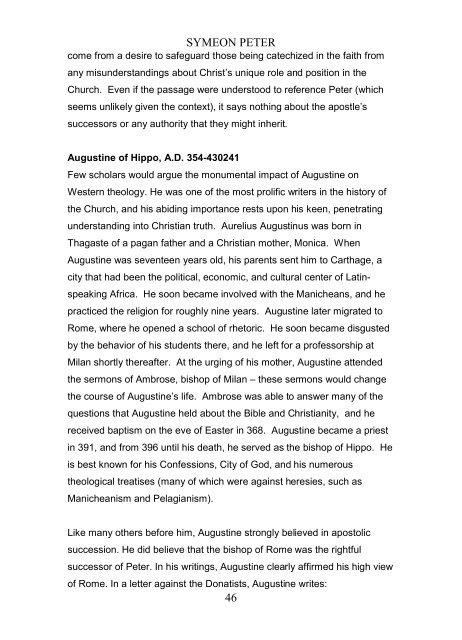You also want an ePaper? Increase the reach of your titles
YUMPU automatically turns print PDFs into web optimized ePapers that Google loves.
SYMEON PETER<br />
come from a desire to safeguard those being catechized in the faith from<br />
any misunderstandings about Christ’s unique role and position in the<br />
Church. Even if the passage were understood to reference <strong>Peter</strong> (which<br />
seems unlikely given the context), it says nothing about the apostle’s<br />
successors or any authority that they might inherit.<br />
Augustine of Hippo, A.D. 354-430241<br />
Few scholars would argue the monumental impact of Augustine on<br />
Western theology. He was one of the most prolific writers in the history of<br />
the Church, and his abiding importance rests upon his keen, penetrating<br />
understanding into Christian truth. Aurelius Augustinus was born in<br />
Thagaste of a pagan father and a Christian mother, Monica. When<br />
Augustine was seventeen years old, his parents sent him to Carthage, a<br />
city that had been the political, economic, and cultural center of Latinspeaking<br />
Africa. He soon became involved with the Manicheans, and he<br />
practiced the religion for roughly nine years. Augustine later migrated to<br />
Rome, where he opened a school of rhetoric. He soon became disgusted<br />
by the behavior of his students there, and he left for a professorship at<br />
Milan shortly thereafter. At the urging of his mother, Augustine attended<br />
the sermons of Ambrose, bishop of Milan – these sermons would change<br />
the course of Augustine’s life. Ambrose was able to answer many of the<br />
questions that Augustine held about the Bible and Christianity, and he<br />
received baptism on the eve of Easter in 368. Augustine became a priest<br />
in 391, and from 396 until his death, he served as the bishop of Hippo. He<br />
is best known for his Confessions, City of God, and his numerous<br />
theological treatises (many of which were against heresies, such as<br />
Manicheanism and Pelagianism).<br />
Like many others before him, Augustine strongly believed in apostolic<br />
succession. He did believe that the bishop of Rome was the rightful<br />
successor of <strong>Peter</strong>. In his writings, Augustine clearly affirmed his high view<br />
of Rome. In a letter against the Donatists, Augustine writes:<br />
46


















